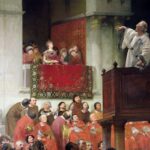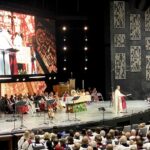( I gave this talk at Christ Episcopal Church, Georgetown in Washington, DC on October 1.)
Bartolomé de las Casas, a Spanish bishop, argued in 1550 against enslaving Indians in the Spanish empire. His debating opponent claimed Spaniards were as superior to Indians as humans were to monkeys. But Bartolomé insisted: “All the peoples of the world are humans, and there is only one definition of all humans and of each one, that is that they are rational.” He said every person, regardless of tribe or religion, has from God “derechos humanos,” or “human rights,” in what was likely that term’s first use.
Interestingly, Bartolomé did not denounce all slavery. He thought slaves seized in just wars, which he at first thought true for Africans, were legitimate. But his underlying assumptions about human rights for all were important.
The development of ideas about human rights, chiefly and originally through Christianity, has been very slow. It can be likened to countless jigsaw pieces thrown to the floor, slowly pieced together across centuries, the final puzzle picture slowly emerging, but even now incomplete.
Part of that picture emerged in 587, when, at least according to Bede, the medieval chronicler, a monk in Rome who later became Pope Gregory the Great, encountered the sale of young boys in the marketplace. Bede recorded:
It is reported that some merchants, having just arrived at Rome on a certain day exposed many things for sale in the slave boys market place, and an abundance of people resorted thither to see slaves from England. Gregory himself went with the rest, and among other things some boys were set to sale, their bodies white, their countenances beautiful, and their hair very fine. Having viewed them he asked, as is said, from what country or nation they were brought, and was told, from the island of Britain, whose inhabitants were of such personal appearance. He again inquired whether these islanders were Christians, or still involved in the errors of paganism, and was informed that they were pagans, then, fetching a deep sigh from the bottom of his heart, he said, ”Alas, what a pity that the author of darkness is possessed of men of such fair countenances ; and that being remarkable for such graceful outward appearance, their minds should be void of inward grace.” He therefore again asked what the name of that nation was, and was answered that they were called Angles. “Right,” said he, “for they in Latin have angelic faces, and it becomes such to be coheirs with the angels m heaven.” Then he proceeded, “What is the name of the province from which they are brought?” It was replied that the natives of that province were called Deiri. “Truly are they de ira,” said he, “withdrawn from wrath and called to the mercy of Christ.” “How is the king of that province called?” They told him his name was Aella, and he, alluding to the name, said, Alleluia, the praise of God the Creator must be sung in those parts.” Then repairing to the bishop of the Roman apostolical see (for he was not himself then made pope), he entreated him to send some ministers of the word into Britain to the nation of the English, by whom it might be converted to Christ.
As pope, Gregory the Great would send the monk Augustine as “the Apostle to England,” where he became the first Archbishop of Canterbury. Gregory was moved by the need for evangelism in England. But note his recorded comments did not express horror about young boys sold into slavery. Every city in the world had such slave markets. The jigsaw pieces of human design genotype and human rights were only slowly assembled.
An important assembler of those pieces was Gregory of Nyssa, a fourth century bishop in Asia Minor who may have made the first sweeping denunciation of slavery. He sermonized:
You condemn a person to slavery whose nature is free and independent, and in doing so you lay down a law in opposition to God, overturning the natural law established by him. For you subject to the yoke of slavery one who was created precisely to be master or mistress of the earth, and who was ordained to rule by the Creator, as if you were deliberately attacking and fighting against the divine command.
You have forgotten the limits of your power. Your authority is limited to ruling over brute beasts. ‘Let them have authority,’ Scripture says (Genesis 1.26), “over the birds and the fishes, the four-footed beasts and creeping things.” How is it that you ignore these creatures which are properly assigned to you in slavery, and rise up against the very creature that is free by nature? How is it that you class one of your own species among four-footed beasts or even reptiles? “You have made all things subject to human beings,” cries the Logos through the mouth of the prophet (Psalm. 8.6), and the passage lists what is subject to reason, namely cattle, oxen, sheep.
Surely human beings have not been born to you from cattle? Surely oxen have not provided you with human offspring? The only mastery a human being can properly exercise is over the brute beasts. Is that such a small thing for you? “You make grass grow for the cattle,” says Scripture (Psalm 104.14), “and fresh plants for the slaves of human beings.” But through your system of slavery you have divided the one species, making members of that species slaves or masters of other members.
“I acquired slaves and slave girls.” Tell me, what price did you pay for them? What did you find among your possessions that you could trade for human beings? What price did you put on reason? How many idols coins did you pay as a fair price for the image of God? For how many gold coins have you sold the nature specially formed by God? “God said, “Let us make humankind in our image and likeness.”’ (Genesis 1.26) Tell me this, who can buy human beings, who can sell them, when they are made in the likeness of God, when they are rulers over the whole earth, when they have been given as their inheritance by God authority over all that is on the earth? Such power belongs to God alone, or rather, it does not belong even to God. For, as Scripture says, “The gifts of God are irrevocable.” (Romans 11.29) Of his own free will God called us into freedom when we were slaves to sin. In that case he would hardly reduce human beings to slavery. But if God does not enslave what is free, who dares put his own authority higher than God’s?
How can the rulers of the earth and all that is on it possibly be sold?
English evangelist John Wesley, who also denounced slavery, made similar points 1300 years later. His theology saw all persons as image bearers of God and divine agents in earthly governance. This vocation is not exclusively assigned to a narrow elect but is, like divine grace, a universal assignment.
Wesley noted that humans bear God’s political image, giving them, as Gregory of Nyssa also quoted from Genesis, “dominion over the fishes of the sea, and over all the earth.” Man is “God’s vicegerent upon earth, the prince and governor of this lower world; and all the blessings of God flowed through him to the inferior creatures. Man was the channel of conveyance between his Creator and the whole brute creation.” This human dominion over creation is corrupted by the fall but God’s political image is not discontinued, though needing redemption.
For Wesley, all humans ultimately were ordained to be co-rulers, not just subjects who live at the whim of others. He wrote: “God’s image upon man consists…in his place of authority. Let us make man in our image, and let him have dominion. As he has the government of the inferior creatures, he is as it were God’s representative on earth. Yet his government of himself by the freedom of his will, has in it more of God’s image, than his government of the creatures.”
Wesley’s theology, in ways he did not imagine, was and is empowering for the poor and marginalized, who bear God’s image and are deputized as His vice regents of His rule on earth. This revolutionary proposal transformed Britain in the 1700s, America in the 1800s, and now, through Pentecostalism, a Wesleyan offshoot, is transforming Latin America and Africa. The jigsaw pieces continue to be assembled.
The jigsaw puzzle of human dignity and human rights for all who bear God’s image and are ordained by Him to co-rule is never complete until Christ returns. Meanwhile, as IRD’s founding statement “Christianity and Democracy” declared:
The churches should relentlessly protest every infringement of freedom, especially of religious freedom. In protesting human rights violations, governments will of necessity take into account many considerations – political, diplomatic, military and economic. The ethics of the Church, however, are distinctively ecclesial. In witnessing to the transcendent dignity of the human person, the churches are bound not by reasons of state but by obedience to Christ. Therefore the witness of the churches should reflect an unwavering adherence to a single standard in the judgment of human rights. Whether the regime in question is repressive only in order to maintain itself in power or whether it aspires to totalitarian control over its people, whether it fashions itself as rightist or leftist, whether it is friend or foe or neutral toward us, to the extent that it violates the rights of people to be artisans of their own destiny, it blasphemes against the divine intent for human life. The churches dare never be apologists for such blasphemy in the name of some higher social good. Because every person is called to be fullness of humanity revealed in Our Lord Jesus Christ, there is no higher good than the human person. With particular respect to the weakest and most vulnerable members of the human community, Christians insist that no human being is expendable.






Comment by David on October 2, 2023 at 8:28 am
There were various forms of slavery including serfdom, indenture, and apprenticeships. Serfs were bound to their location which was owned by a feudal lord. They were usually not bought or sold unless the property was sold. The Black Death, which also ended the “Age of Faith,” prompted the demise of this social system in Western Europe, though not in the eastern areas.
Indentures were a form of slavery for a predetermined period of years in return for the owner paying off a person’s debt. German immigrants in Philadelphia in the 1700s might arrive unable to pay the passage that was due upon docking. They were then offered to persons willing to pay the fee in return for an indenture of perhaps 4-7 years. However, the passengers could refuse any offer but were otherwise confined to the ship in often very unhealthy conditions. These immigrants were called “Redemptioners.”
Apprentices were bound to a master for a period of years in return for being taught a trade and sometimes payments to the parents. Early American newspapers were full of ads for the return of runaway apprentices, indentured persons, and African slaves.
Precolumbian America had slavery, though it differed in many ways from African slavery. Enslaved persons could own property, buy their freedom, and even purchase their own slaves.
While there might have been a debate over African slavery, owners tended to point to biblical passages supportive of slavery. There are no abolitionists in the Bible.